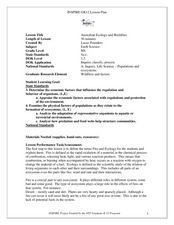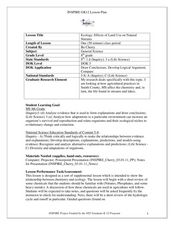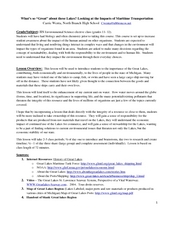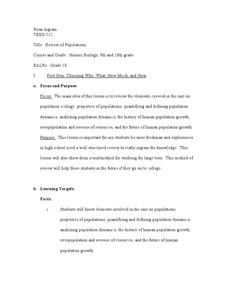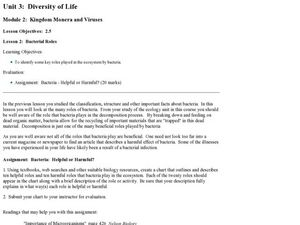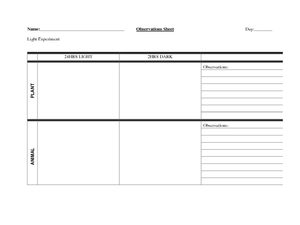Curated OER
A River Runs Through It
Students solve an environmental problem on a local river. They use their knowledge of river ecology to develop an action plan. They use river-monitoring equipment to collect river- monitoring data, including biological, physical, and...
Curated OER
How Harmful Is It?
Students complete a form that requires them to make decisions about how severely different types of marine debris affect people, animals, vessels, communities. Results are totaled and analyzed to determine which types of marine debris...
Curated OER
Chemical Engineer
Students identify toxic household products. In this ecology lesson, students research on the health effects, rating and disposal of these products. They rank them based on the danger they pose.
Curated OER
Creating a Disaster
Learners construct a volcano model. In this earth science lesson, students determine the structure and build of their volcano. They explain the danger of volcanic eruptions.
Curated OER
Be the Kiwi: What is going on in New Zealand?
Students study the three environmental issues facing New Zealand today. In this ecology lesson, students brainstorm some solutions to these environmental issues. They share what they have written in their journals.
Curated OER
It’s Your Trash!
Students identify the different sections of a landfill. For this ecology lesson, students brainstorm ways that they can help in proper trash disposal. They write a reflection journal about their thoughts on the subject.
Curated OER
Becoming the Great Lakes Invasive Species Czar: A Game to Show the Difficulty in Controlling Invasive Species
Tenth graders explore different ways to control aquatic invasive species. In this ecology lesson plan, 10th graders play the role of a member of the Dept of Natural Resources. They decide whether money should be spent on control or...
Curated OER
Australian Ecology and Bushfires
Eighth graders discuss the different types of ecosystem. In this earth science lesson, 8th graders explain the benefits and harm of fire. They research articles about bush fires or controlled burn instance and share it with the class.
Curated OER
Ecology: Effects of Land Use on Natural Streams
Eighth graders examine how humans affect various ecosystems. In this ecology instructional activity, 8th graders discuss different ways that contaminants enter the stream. They explain the consequences of eutrophication in lakes.
Curated OER
Deforestation
Learners identify the different tropical rainforests in the world using a map. In this ecology instructional activity, students describe the different methods of deforestation. They create a memo and present it to class.
Curated OER
Introduction to Ecology
Eighth graders identify the living and nonliving components of an ecosystem. In this ecology lesson, 8th graders explain the role each organism plays. They participate in class discussion and answer a quiz at the end of the lesson.
Curated OER
Hydrology: Flood Mitigation
Twelfth graders discuss the different factors that can contribute to major floods. In this ecology lesson, 12th graders analyze collected rainfall data. They complete a scavenger hunt after the lesson.
Curated OER
Invasive Species
Eighth graders explain the impact of exotic species to an ecosystem. In this environmental science lesson, 8th graders brainstorm ways to eliminate invasive species. They share their ideas in class.
Curated OER
What’s so “Great” about these Lakes?
Students label the regions and major ports of the Great Lakes region. In this environmental science lesson, students create a timeline about the history and development of the Great Lakes. They discuss the problems its facing today.
Curated OER
Ecology: Symbiosis
Eighth graders identify various types of symbiotic relationships. In this ecology lesson, 8th graders predict whether certain organisms can form symbiosis with other organisms. They discuss and defend their reasoning.
Curated OER
Science with Mud!
Eighth graders give some examples of chemical reactions they see everyday. In this chemistry lesson, 8th graders investigate how much water soil can hold. They collect data and compare results with others.
Curated OER
Introduction to Biomes
Eighth graders identify the different kinds of biomes. In this life science instructional activity, 8th graders explain their importance in an ecosystem. They take a BrainPop quiz at the end of the instructional activity..
Curated OER
Powering a Green Earth
Students compare and contrast renewable and nonrenewable energy. In this environmental science instructional activity, students discuss the importance of going green. They identify the different components in a power grid system.
Curated OER
Are You Thirsty: The Effects of Pollution on Drinking Water
Middle schoolers discuss the different causes of water pollution. In this ecology lesson, students brainstorm ways to purify polluted water. They formulate their conclusion based on the results of the experiments.
Curated OER
Review of Populations
Learners review the concept of populations. In this Biology lesson plan, students will work with a partner to talk through what they remember from the unit on populations. The class will then begin to work through a concept map as a way...
Curated OER
Laws of the Jungle
Students build a video game on predator-prey relationship. In this biology lesson, students identify the variables that affect this relationship. They write a short description and play each other's game.
Curated OER
Bacterial Roles
Students study bacteria and the role it plays in the ecosystem. In this bacteria instructional activity students research the roles bacteria has and submit a chart.
Curated OER
Elements of Biology: Biomes
Students describe the different types of biomes. In this biology lesson, students create a map of assigned biome with descriptive paragraphs. They share their findings to class.
Curated OER
Organisms – Their Needs
Students compare and contrast different organisms characteristics. In this life science lesson, students design an experiment about plants and animals needs. They collect data and write their conclusion about the experiment.









